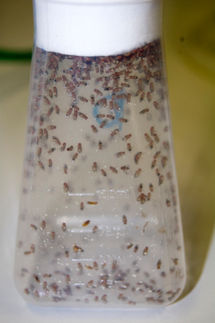Study gives clues to how adrenal cancer forms
Dysfunctional telomeres can trigger cancer mutations, U-M researchers find
Advertisement
At the ends of chromosome are special pieces of DNA called telomeres. Think of it as the little tip that caps off a shoelace. The telomeres send signals to the cells to let them know it's the end point, not a break that should be repaired. Over time, as cells reproduce, the telomeres become shorter and eventually no longer do their job. The cells then have a higher risk of mutating into cancer.
But, a new study finds, if the telomere becomes dysfunctional at any point – regardless of shortening – it can trigger a cancer event. The study, by researchers at the University of Michigan Comprehensive Cancer Center, was done in mice generally prone to develop cancer. The mice that also had dysfunctional telomeres were particularly prone to develop the usually ultra-rare adrenocortical cancer. This is the first mouse model to specifically address this rare but lethal type of cancer.
"Usually when telomeres get short, they also seem to get deprotected. No one's been able to say if it's the shortening or the deprotection that causes cancer to arise. In this study, we were able to show that deprotection alone, even in the absence of a short telomere, is enough to trigger cancer. This may be a general mechanism of adrenal cancer as well as many other cancers in the body," says study author Gary Hammer, M.D., Ph.D., the Millie Schembechler Professor of Adrenal Cancer at the U-M Comprehensive Cancer Center.
The researchers also found that a protein called p53 usually prevents the cancer trigger. P53 is critical to the cell destruction process. When it's missing, cells replicate uncontrolled, the hallmark of cancer. In this study, the researchers eliminated p53 in the mice and found that the dysfunctional telomeres then tried to repair themselves. This led to breaks in the chromosome, causing scrambled genes and mutations.
"P53 mutation together with telomere dysfunction may be the basis for the genomic changes we see in adrenal cortical cancer and other malignancies," says study author Tobias Else, M.D., a post-doctoral fellow and Garry Betty Scholar in Adrenal Cortical Cancer Research at the U-M Comprehensive Cancer Center.
"This work proves a basic science principle and gives us understanding of how these genetic changes occur to give us this cancer. But it is not just limited to adrenal cancer. Our research started with the adrenal gland, but we saw tumors form in multiple parts of the body. This will be of broader interest to the scientific community," Else says.
Original publication: Cancer Cell 2009, Vol. 15, Issue 6, pp. 465-476.


















































